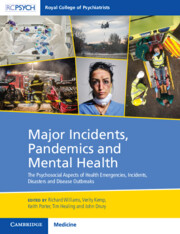 Major Incidents, Pandemics and Mental Health
Major Incidents, Pandemics and Mental Health Book contents
- Major Incidents, Pandemics and Mental Health
- Major Incidents, Pandemics and Mental Health
- Copyright page
- Dedication
- Contents
- Figures
- Tables
- Boxes
- Contributors
- Foreword by Dr Adrian James
- Foreword by Professor David Lockey
- Section 1 The Nature and Impacts of Twenty-First-Century Healthcare Emergencies
- Section 2 Clinical Aspects of Traumatic Injuries, Epidemics, and Pandemics
- Section 3 The Role of the Public in Emergencies: Survivors, Bystanders, and Volunteers
- Section 4 Responses to Meet the Mental Health Needs of People Affected by Emergencies, Major Incidents, and Pandemics
- Chapter 27 Principles for Intervening with the Wellbeing, Psychosocial, and Mental Health Needs of Mass Casualties
- Chapter 28 Facilitating Psychosocial Care for the Public After Major Incidents and During Pandemics
- Chapter 29 Mental Healthcare Required by People Who Are Affected by Major Incidents and Pandemics: Lessons from Research
- Chapter 30 Responding to the Needs of Children, Young People, and Their Families During the COVID-19 Pandemic
- Chapter 31 Social and Educational Impacts of Epidemics and Pandemics
- Chapter 32 Quarantine, Lockdown, and Isolation in the COVID-19 Pandemic
- Chapter 33 Reflections on Managing Infectious Diseases in Mental Health Units
- Chapter 34 Case Study 1: The Omagh Bomb, the Mental Health Response, and the Lessons Learned
- Chapter 35 Case Study 2: A Public Health Survey of People Exposed to the Paris Terror Attacks in November 2015 and Their Consequences
- Chapter 36 Case Study 3: Practical Approaches to Delivering Psychosocial and Mental Healthcare for the Public in the UK: Lessons Learned from a Major Incident in Manchester
- Section 5 Sustaining and Caring for Staff During Emergencies
- Section 6 Designing, Leading, and Managing Responses to Emergencies and Pandemics
- Section 7 Key Lessons for the Way Forward
- A Glossary of Selected Key Terms Used in This Book
- Index
- References
Chapter 29 - Mental Healthcare Required by People Who Are Affected by Major Incidents and Pandemics: Lessons from Research
from Section 4 - Responses to Meet the Mental Health Needs of People Affected by Emergencies, Major Incidents, and Pandemics
Published online by Cambridge University Press: 11 January 2024
- Major Incidents, Pandemics and Mental Health
- Major Incidents, Pandemics and Mental Health
- Copyright page
- Dedication
- Contents
- Figures
- Tables
- Boxes
- Contributors
- Foreword by Dr Adrian James
- Foreword by Professor David Lockey
- Section 1 The Nature and Impacts of Twenty-First-Century Healthcare Emergencies
- Section 2 Clinical Aspects of Traumatic Injuries, Epidemics, and Pandemics
- Section 3 The Role of the Public in Emergencies: Survivors, Bystanders, and Volunteers
- Section 4 Responses to Meet the Mental Health Needs of People Affected by Emergencies, Major Incidents, and Pandemics
- Chapter 27 Principles for Intervening with the Wellbeing, Psychosocial, and Mental Health Needs of Mass Casualties
- Chapter 28 Facilitating Psychosocial Care for the Public After Major Incidents and During Pandemics
- Chapter 29 Mental Healthcare Required by People Who Are Affected by Major Incidents and Pandemics: Lessons from Research
- Chapter 30 Responding to the Needs of Children, Young People, and Their Families During the COVID-19 Pandemic
- Chapter 31 Social and Educational Impacts of Epidemics and Pandemics
- Chapter 32 Quarantine, Lockdown, and Isolation in the COVID-19 Pandemic
- Chapter 33 Reflections on Managing Infectious Diseases in Mental Health Units
- Chapter 34 Case Study 1: The Omagh Bomb, the Mental Health Response, and the Lessons Learned
- Chapter 35 Case Study 2: A Public Health Survey of People Exposed to the Paris Terror Attacks in November 2015 and Their Consequences
- Chapter 36 Case Study 3: Practical Approaches to Delivering Psychosocial and Mental Healthcare for the Public in the UK: Lessons Learned from a Major Incident in Manchester
- Section 5 Sustaining and Caring for Staff During Emergencies
- Section 6 Designing, Leading, and Managing Responses to Emergencies and Pandemics
- Section 7 Key Lessons for the Way Forward
- A Glossary of Selected Key Terms Used in This Book
- Index
- References
Summary
Although many people will experience a mental health reaction to major incidents and pandemics, only a minority of people affected are likely to require mental healthcare. Most people will not develop a mental disorder, but common conditions will be precipitated, such as adjustment disorders, anxiety disorders, depressive disorders, post-traumatic stress disorder (PTSD), and substance use disorders. Other conditions include complex PTSD, prolonged grief disorder, psychosis, somatic symptom disorders, and neuropsychiatric consequences of infection in pandemics. The evidence for the prevention of mental disorders through formal interventions is very limited, and contrasts with strong evidence for effective treatments. In order to provide optimal care following major incidents and pandemics a biopsychosocial framework is appropriate, with mental health service provision being part of a whole system approach. A seamless, person-centred mental healthcare pathway for those affected would probably involve first responders, primary care, secondary physical care, the third sector, and social care.
Keywords
- Type
- Chapter
- Information
- Major Incidents, Pandemics and Mental HealthThe Psychosocial Aspects of Health Emergencies, Incidents, Disasters and Disease Outbreaks, pp. 213 - 222Publisher: Cambridge University PressPrint publication year: 2024


